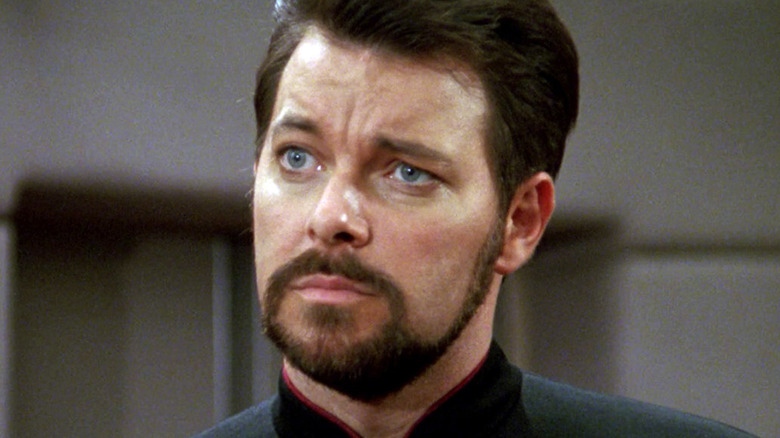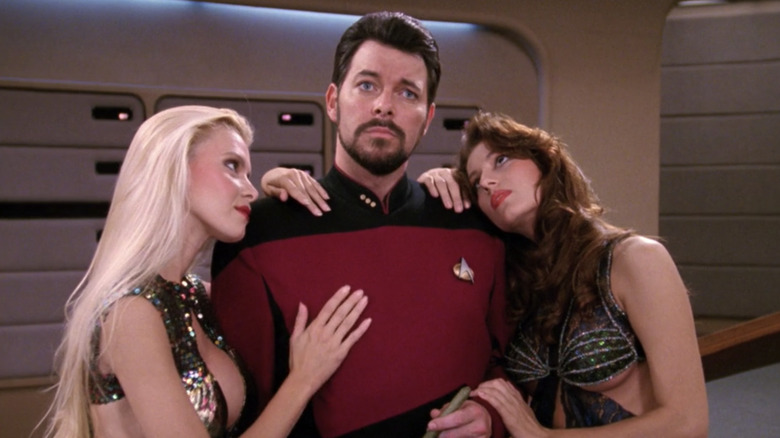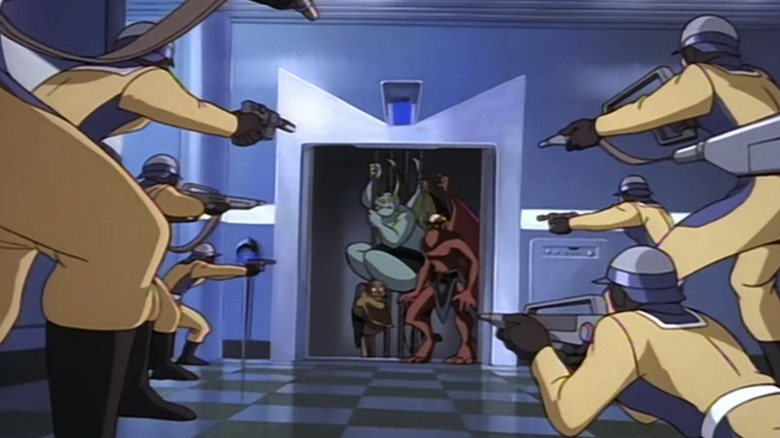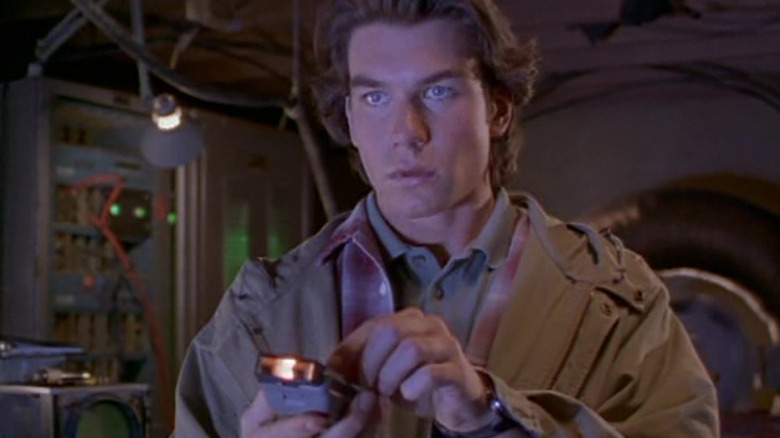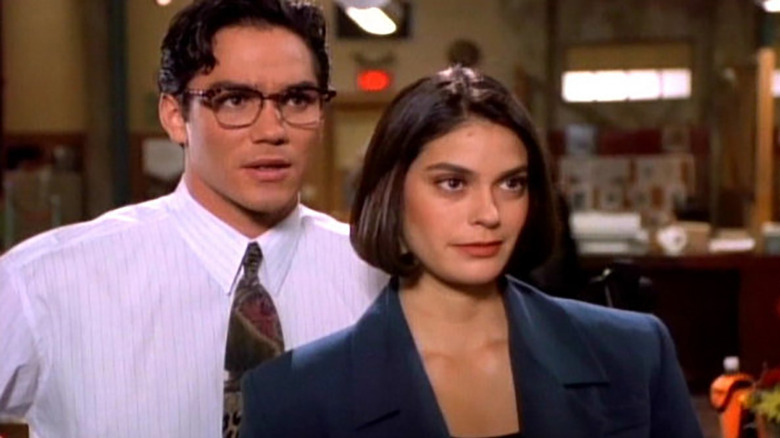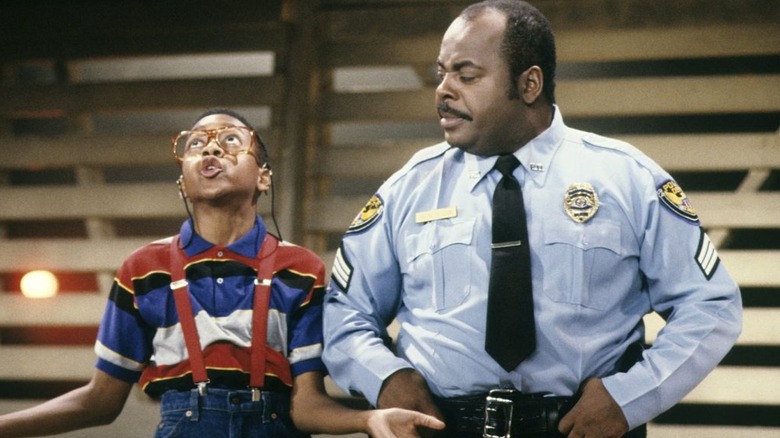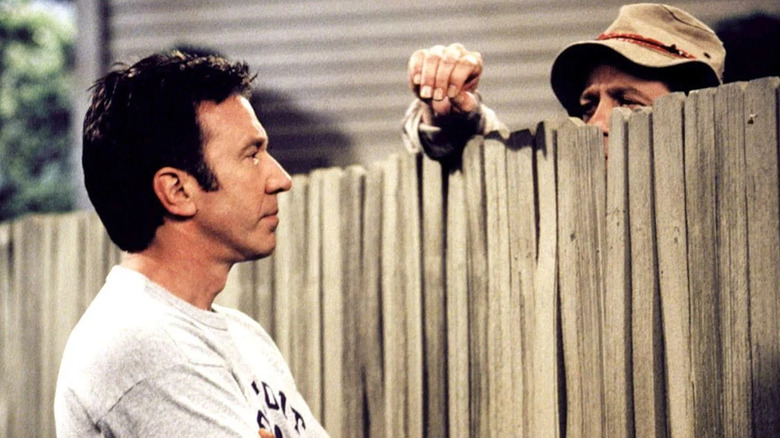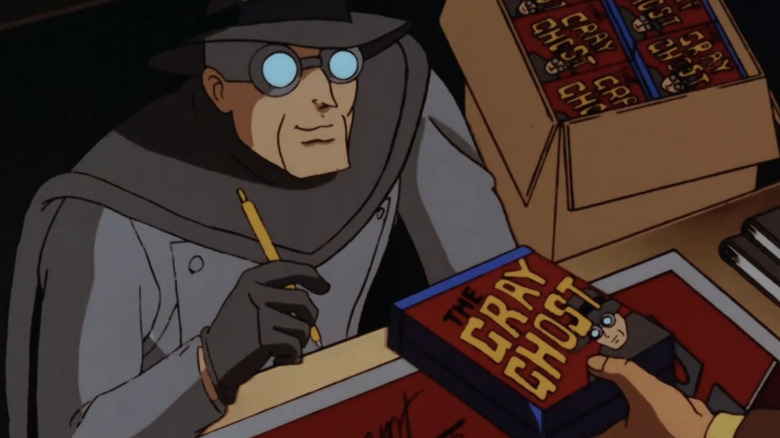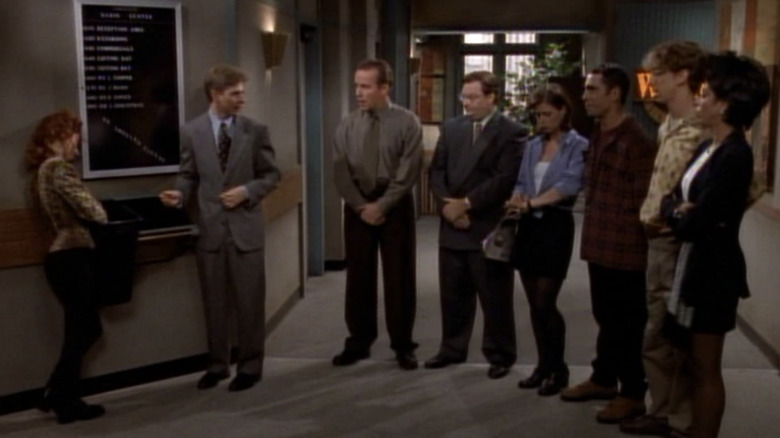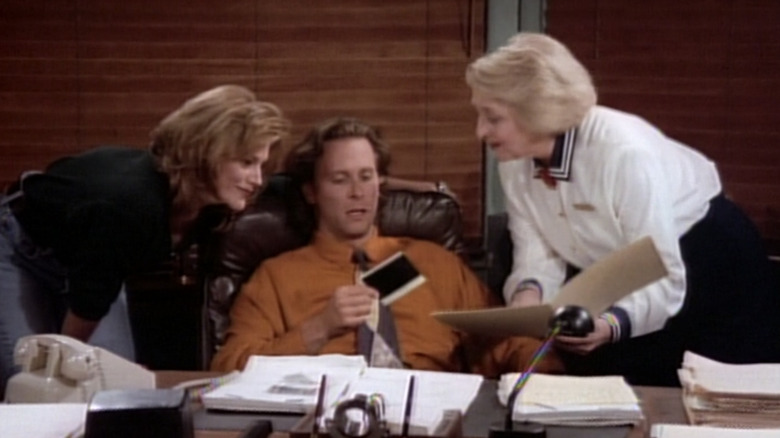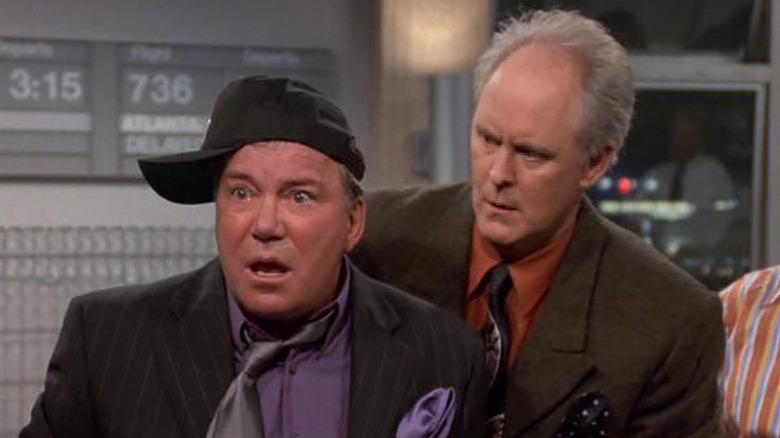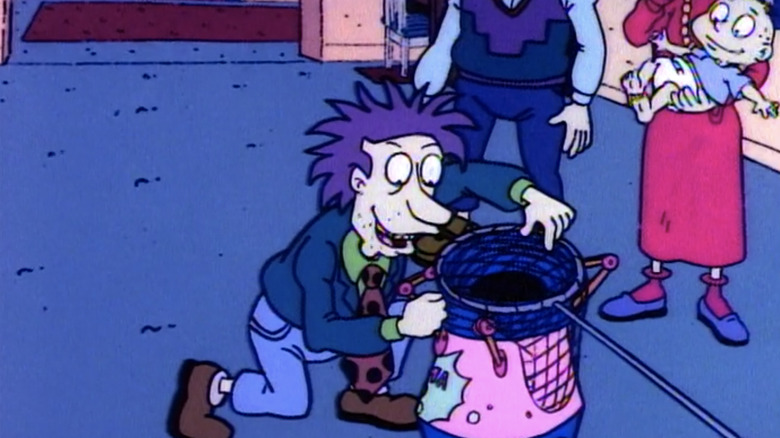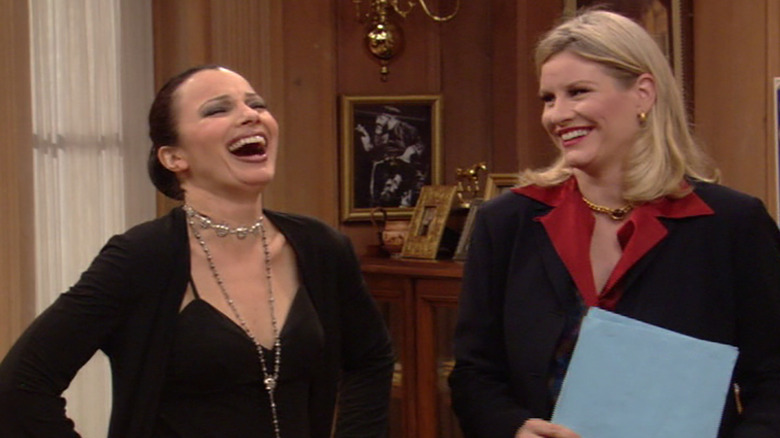Things Only Adults Noticed In These Iconic '90s TV Shows
The 1990s represented a new golden age for television. Sitcoms grew into maturity with sharper writing and a faster-paced, more sarcastic kind of comedy, giving us such all-time classics as "Seinfeld," "Friends," and "Frasier." Animation came of age with pioneers like "The Simpsons," "Ren & Stimpy," and "Batman: the Animated Series," giving cartoons an edge we'd never seen before.
TV writers in the '90s loved throwing in subtle adult themes, darker moments, and references to music, movies, and politics just for the adults in the audience. More often than not, these were moments that the younger viewers watching — who saw little more than the surface level entertainment flashing on their tube TVs — probably missed out on.
Now, thanks to streaming services, an entirely new generation of kids is discovering these classics, and grown-up audiences are re-discovering all their '90s favorites. But more than 20 years after they originally aired, some of us who watched them as kids are suddenly finding a whole new side to these shows we thought we knew. Through a mix of age, experience, and perspective, viewers are looking back and finding things they didn't notice when they were younger.
From mature themes to self-referential gags, here are some things only adults notice in iconic '90s television shows.
Star Trek: The Next Generation's attitude on casual sex
The Enterprise-D was many things, from explorer of the final frontier to protector of interstellar peace, but it often felt like the 24th century's Galactic Tinder, cruising through space and matching up its Starfleet crew members with random guest stars nearly every other episode in a series of star-crossed one-night stands and forgettable flings.
Nobody seemed to bat an eye when Riker would spend the night with a woman he just met on an away mission to a planet he'd never visit again. We hardly see so much as a critical squint when the Federation's finest seek out purely sexual close encounters that last less than an episode — even if they're under the influence of an alien, mind-wiped by a malevolent race of space tyrants, or being controlled by a telepathic madman — and when they do fall in love, it's treated as outside of the norm.
Riker's easygoing view of sex is never judged, and is often admired by those around him, men and women alike. When he and Troi briefly rekindle their pre-Enterprise romance in the episode "Menage-a-Troi," it barely gets a follow-up, as they share what could be inferred as more than a passionate prolonged kiss, and then resume their platonic relationship as if it never happened (but hey, that's episodic television for you). Kids may not have noticed the way the crew seemed to regard physical intimacy so casually, but to us adults watching, it was clear that by the 24th century, sex had become accepted as little more than something fun that grown ups did to pass the time.
Gargoyles tackles racism
Speaking of "Star Trek," "Gargoyles" features Riker himself, Jonathan Frakes, as the evil genius and diabolical puppet master David Xanatos. A foil for the show's lead gargoyle Goliath (Get it? David and Goliath?), Xanatos resurrects the gargoyles from a thousand years in stone using a rediscovered magic spell.
The show was squarely aimed at kids, but also tackled adult issues like gun violence and poverty right out in the open. A bit more subtle, though, was their approach to racism, and nowhere was this more evident than in the life of immortal villain Demona.
In flashbacks, Demona and her surviving gargoyle clan are the target of a man called Gillcomgain and his misguided quest for revenge. Over the centuries of her endless life, she's seen her dwindling kind hunted by humans just because they're different, an experience that has turned her from a protector into a stone cold killer. In the present, the cycle of vengeful violence has reached its zenith, and she wants nothing more than to destroy every last human on Earth.
Goliath tries to set her straight, but it's a repentant Xanatos who becomes an unexpected ally to the gargoyles when the world at large discovers their existence. The descendants of Gillcomgain lead a group known as the Quarrymen (a not-so-subtle Klu Klux Klan analog, complete with pointed hoods), who rile up the public into a frenzy against the gargoyles. The show illustrates — in family friendly fashion — how hatred begets hatred, and how big business and politicians can turn fear of those who are different into an existential threat to exert power and control.
Sliders' alternate reality that almost came true
Long before "The Flash" was hopping between worlds on The CW, before Rick Sanchez showed us infinite universes, and before Marvel's "What If?" gave us alternate animated realities, a show from the mid 1990s was sending its heroes through the multiverse. After walking through a portal he creates in his basement, Quinn Mallory and his friend Wade are forced to jump from reality to reality to find their way back to their own.
In the first season episode "The Weaker Sex," the group finds themselves in a world where traditional gender roles are reversed: women are the dominant sex and hold positions of power, and men suffer from unequal pay and gender discrimination. It's one moment just after they arrive that will catch an adult's attention, when they hear that the president is about to give a speech. Upon hearing a street vendor confirm that it's President Clinton, the gang thinks they've found their own reality ... only to be surprised when they see Hillary Clinton at the podium, not Bill.
That's right — more than 20 years before the real Hillary Clinton would nearly become president, "Sliders" showed us a world where she's the leader of the free world. Some viewers might have thought this was simply a clever role reversal (and, of course, it was), but it was also a nod to her real-life political aspirations, which were already a topic of discussion by the mid '90s.
Lois & Clark and the post-modern feminist
A soap opera with superheroes, "Lois & Clark" was a little bit "Moonlighting" and a little bit "Beverly Hills 90210," with a little bit of campy action thrown in. It gave us a look at where post-feminism stood in the 1990s: past women's lib and the '80s yuppie conservatism, we now saw the rise of the third wave.
Lois starts out uptight and snooty, even a little sexually repressed, exhibiting every stereotype of a '90s feminist (to be fair, Clark exhibits the stereotypes of the post-macho "sensitive '90s man"). She is willful and defiant, thumbing her nose when her friends insist she needs a man. But despite her independence, in private she's vulnerable, admitting that she does want companionship.
This show's Lois is more than a working woman — she's a career minded woman, driven to reach the top of her profession; more than just a damsel in distress, she's a woman who can save herself. For Lois, being a feminist doesn't mean being masculine or not having a man — it means making her own choices, having her own goals that she chooses, and never letting her love life define her.
That was the point of putting her name first in the series title: this wasn't a show about "Superman's girlfriend Lois Lane," this was a show about two equals. Kids probably saw Superman flirting with his future wife and thwarting soap opera villains, but the rest of us saw Lois as an example of what a '90s woman could be.
Family Matters and everyone's favorite Hollywood cop
Every now and then we watch a show and sit up and point at the screen with a cocked eyebrow and shout, "Hey I know that actor!" But no adult watching "Family Matters" in the '90s struggled to figure out where they had seen Carl Winslow before. That's because actor Reginald VelJohnson, even when the show premiered in 1989, had built an entire career playing loveable but tough law enforcement characters.
From the jail guard in "Ghostbusters" to Tom Hanks' partner Officer Sutton in "Turner & Hooch," VelJohnson's breakout role as Sgt. Al Powell in "Die Hard" gained him attention in tinseltown. The role won him a guest spot as a similar character in the ABC sitcom "Perfect Strangers" named Carl Winslow, a Chicago cop and the husband of series regular Harriet Winslow. The one-time appearance of the entire Winslow household proved so popular with audiences and studio executives alike that the story of Harriet, Officer Winslow, and their family was spun off into its own show later that same year: "Family Matters."
Stubborn, stern, and irascible, but also humble, lovable, and kind, Carl is what everyone wanted their corner cop to be. VelJohnson never seems to mind being typecast — he would even return as Sgt. Al Powell in an episode of "Chuck" in 2008, and as Detective Sutton in the Disney+ reboot of "Turner & Hooch." For kids watching "Family Matters," he was just another short-tempered, funny dad, always angry with annoying neighbor Urkel, but for adults, he was the best cop in Hollywood.
Home Improvement taught us the dangers of toxic masculinity
When most viewers think of Tim Taylor, they usually think of "more power," animalistic grunts, and over-the-top misfires of souped-up household appliances. But while the exploding gas grills and out-of-control dishwashers were played for laughs, most adults understood that those misfires were also a lesson that more masculinity was never the answer.
Beyond his wild antics, "Home Improvement" finds Tim seeking the helpful counsel of his friends and family. Most often, it's his next door neighbor: the suburban philosopher Wilson guides him through family problems and teaches him important life lessons about love and acceptance, whether it's his youngest son's goth phase, or yielding the spotlight as a helper on a cooking show.
Likewise, "Tool Time" assistant Al Boreland may be a more sensitive, less stereotypically masculine figure, but the soft-hearted sidekick is often portrayed as the show's conscience. He regularly gives Tim advice when dealing with his kids — advice Tim takes to heart — illustrating that kindness and sensitivity are every bit as manly as driving a beefed-up muscle car or using an overpowered chainsaw.
Batman: The Animated Series was a fan's dream come true
"Batman: The Animated Series" was undeniably a love-letter to its creators' favorite comic superhero, and this was never more evident than in the episode "Beware the Gray Ghost." The Gray Ghost was an original character not seen in the pages of the comic books, created specifically for this story. A masked TV crimefighter, he's a pastiche of classic '40s and '50s superhero serials like "The Shadow," "The Phantom," and "Zorro." But he's also an homage to Batman himself, and series co-creator Bruce Timm recruited none other than Adam West — the first TV Batman — to voice Gray Ghost, nearly 25 years after he had last played the Caped Crusader on the classic live-action series.
The Gray Ghost is a TV character played by actor Simon Trent who, now retired, becomes an unwitting suspect in a plot by a mysterious terrorist known only as "The Mad Bomber." But the homage goes even deeper than West's appearance — Bruce Wayne in this story could essentially be a stand-in for Timm himself when Wayne tells Trent that he watched the show as a child, even partly designing his Batman persona after him when he decided to become a crime-fighting vigilante. This could well be interpreted as Bruce Timm himself telling Adam West what a big fan he was, and how Batman had guided his career to success. Want more proof? The Mad Bomber turns out to be a Gray Ghost fanboy, voiced by Bruce Timm.
NewsRadio's refusal to play by the rules
NBC had high hopes for "NewsRadio" as a vehicle for Phil Hartman, but as the show progressed, it rubbed them the wrong way. The network moved its time slot so much that producers believed it was an attempt to kill their ratings. The network reportedly hated the show, and the feeling was mutual (with creator Paul Simms calling NBC's "must see" lineup a "double decker s**t sandwich"). While NBC had wanted to explore the romance between the two leads, the writers balked at the idea of an ongoing "will they/won't they" story and had the pair sleep together ... in the second episode.
When they had to take part in a multi-show event to market the film "Four Weddings and a Funeral," with each series including a wedding or funeral, "NewsRadio" mocked the promotion by eulogizing a rat. In "The Injury," they angered the network by used the word "penis" four times ... in an episode that saw broadcaster Bill saying the very same word in an on-air editorial criticizing another broadcaster for saying it. The episode was held back by the network for a year, and was partly censored in syndication and on DVD.
Filled with razor-sharp wit and impeccable chemistry among the cast, "NewsRadio" was comedy gold, but only adults saw how brazenly they bucked the norms of the run-of-the-mill 90s sitcom.
Wings showed the struggle of small business owners
"Wings" was about as run-of-the-mill a sitcom as existed in the early '90s. At its center were Joe and Brian Hackett, two brothers reunited after the death of their father leaves them in charge of a small island airline, Sandpiper Air. Though the humor was laced with childish fat jokes and flat one-liners, its oddball characters and storylines helped make it stand out. We also saw a story of two brothers' attempt to run a small business in the shadow of a bigger competitor (the blustery Roy Biggins), and the challenges they face keeping the airline afloat.
This becomes a recurring theme as even small inconveniences nearly ruin them. In the episode "High Anxiety," Joe is unable to fly and the unreliable Brian becomes a full-time pilot, putting the business in peril. In "My Brother's Back and There's Going to be Trouble" and "Joe Blows," Brian must run the airline entirely, nearly running Sandpiper into the ground on two separate occasions.
And it's not just the Hacketts — Helen Chapel struggles with her lunch counter business, almost losing it on more than one occasion, while comical cabbie Antonio Scarpacci is said to be "right below the poverty line." In the episode "All's Fare," Antonio is hired by wealthy magnate Gavin Rutledge, but when he catches his new boss two-timing his crush Casey, he has to decide whether his enormous paycheck is worth his conscience. He does the right thing at the cost of his lucrative new job. To adults, these stories explore the familiar struggles faced by small, struggling business owners.
3rd Rock from the Sun and that Twilight Zone connection
There was no better '90s sitcom about a family of undercover aliens stranded on Earth than "3rd Rock from the Sun." That's largely thanks to John Lithgow, who gave a suitably bizarre performance as Dick Solomon, the family's alien commander who would periodically send status reports back to their home planet to their leader, known only as the Big Giant Head.
The Big Giant Head went unseen for nearly four seasons. When he finally did appear, The Big Giant Head took human form and was played by "Star Trek" icon William Shatner. While audiences of all ages could cackle at Shatner's over-the-top take on the alien overlord, what kids probably missed was the clever reference hidden in the first exchange between Shatner's Big Giant Head and Jon Lithgow's Dick.
As "B.G. Head" arrives at the airport to greet them, Sally asks how his flight was. Shatner proceeds to tell them the horrifying tale of the monster he saw on the wing of the plane while in flight, and Dick responds, "The same thing happened to me!" This very clearly recalls Shatner's role in the classic "Twilight Zone" episode "Nightmare at 20,000 Feet," an episode that was later adapted as part of the 1983 "Twilight Zone" film starring Lithgow in Shatner's original role.
Rugrats showed the challenges of a creative professional
One of the seminal Nickelodeon cartoons of the early '90s, "Rugrats" gave us the infant adventures of Tommy, Chuckie, Phil, Lil, and Angelica (and later Susie, Kimi, and Dil). Just as important are Tommy's parents, Stu and Didi. While Didi is a working mom, Stu is a stay-at-home dad.
Ostensibly a toy inventor, we're given the impression that he's not a successful one, no matter how many times he announces each new invention as the toy that "will put Pickles Toys on the map." But he does fashion a number of working, innovative toys, including an advanced robot called Mr. Friend, a Reptar mech suit, a working antigravity playpen, and a remote controlled hover car, among others.
What kids may not have noticed is that he's the perfect example of a freelance creative professional: he works from home, his creative spark comes and goes, and he suffers bouts of creator's block. That all comes to a head in the episode "Stu Gets a Job," when he's stuck on a new idea and money gets tight. He takes a job as a salesman for Consolidated Lard, lamenting that he's now a "wage slave."
It's clear to adults that Stu isn't cut out for the rigidity of a traditional day job, even if he's a creative genius. But he always manages to keep his inventions coming: he quits Consolidated Lard when he has a breakthrough on his latest invention, the Bubblerama 3000.
The Nanny and Bobbi Flekman
On the long-running CBS sitcom "The Nanny," Fran Drescher starred as Fran Fine, the self-proclaimed fashionista who shows up on the doorstep of British millionaire Maxwell Sheffield and becomes live-in nanny to his children Maggie, Brighton, and Grace. Flanked by uptight butler Niles and Maxwell's business partner C.C. Babcock, Fran hams it up as the out-of-place loud-mouthed New Yorker stuck in the middle of the stuffy, aristocratic British-American household. Many viewers probably recognized Drescher from her film roles in the '80s, and in one stand-out episode, "The Nanny" delivered a particularly clever callback.
In the fourth season episode "The Bobbi Flekman Story," Drescher plays dual roles thanks to the clever use of split screen and camera tricks; first of course as the titular nanny, but also as "guest star" Bobbi Flekman. In the episode, Brighton wins a contest to meet music star Brian Setzer and have a music video filmed at their home, and Setzer's hotshot manager Bobbi Flekman comes with him. We quickly learn that Bobbi and Mr. Sheffield have a history, though Fran incorrectly assumes it was romantic when she spies him giving her a kiss. Hoping to push them apart, she impersonates Bobbi (easy to do once she realizes the obvious resemblance) to stop them from getting together.
Some probably took this as little more than a new twist on the "Doppleganger Dating" trope, where a new love interest is eerily similar to another established character, but many adults will remember that Drescher had played Flekman before, in the 1984 mockumentary cult classic "This is Spinal Tap."
